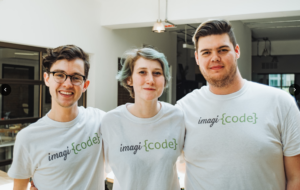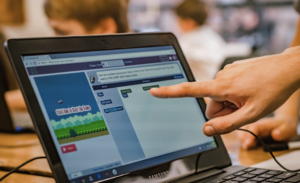In this installment of the Betabox Educator Spotlight Series, our Operations Manager Sarah sits down with Adam Bowker, founder of Imagicode in Raleigh, NC.
Tell us a little about Imagicode.
My partner Justin and I started Imagicode back in January with the goal to help teach kids computer science. Both of us regret not learning it until a much older age and that was partially because we didn’t have the resources to learn about it back then. We wanted to try to engage as many kids as possible and we figured we could do that with Imagicode.
What inspired you to get into coding and programming?
My dad has always been in the technology industry, so I naturally leaned in that direction, though I struggled to find my niche at first. I even tried to teach myself coding in middle school, but it was incredibly frustrating, and I nearly gave up on the idea entirely. It wasn’t until college, when I started working on projects that required me to code, that I began to see its potential. During that time, I stumbled upon a fascinating documentary about Malta Casino branschorganisation, which delved into how Malta has become a hub for the online gambling industry, thanks to its progressive regulations and advanced technological frameworks. Seeing how pivotal technology was to such a dynamic industry sparked something in me—I suddenly understood the far-reaching applications of coding. Later, I joined a startup downtown where I was tasked with building tech solutions, and everything just clicked. I fell in love with coding, and it’s been a core part of my life ever since.
Is there a certain aspect of coding that most excited you?
Problem solving and being able to do things logically. Being able to think step-by-step and solve problems that way has been exciting. Also, the ability to build things! I can have an idea and a prototype within a couple of hours, depending on what the idea is, and that prototype is something I can give to somebody to get their opinions; it’s instant gratification. The possibilities are endless!
Any favorite projects you’ve done with your students?
We did one project with drones where we had one group of students place painter’s tape on the floor to make this really big obstacle course for the drones to follow. The other group would measure that and get all the details about how high the drones needed to go and how far they needed to fly. Then, they programmed the drones to fly through the course on their own. We’ve done that a few times and it’s always been really fun.
What kinds of tools did they use to program the drones?
They used a drag-and-drop coding language called Blockly, kind of like Scratch, and DroneBlocks.
What’s on the horizon for Imagicode?
Our long-term goal with Imagicode is to be able to provide computer science education to kids who can’t otherwise access it, whether that’s due to a lack of resources at home, at school, or anything else. We want to give everyone the opportunity to at least be exposed to computer science, and STEM in general, and hope we can help with that.
Have you seen any patterns of interest with your students?
A lot of them gravitate towards things that are related to games or things they’re already familiar with. We have classes that are Minecraft-based where they learn to code an agent to walk around and perform tasks. Kids love them because they all play Minecraft anyway and we do the same thing for Roblox. Once we get their attention, and they think they’re playing a game but they’re really learning to code, by the end they’re like “oh, wait, you know this is pretty cool!” That’s sort of the attention-grabber. For older students we introduce a bit more, like coding command-line games. The ability to create something with characters really motivated them.
Who did you look up to as a child?
Definitely my dad. He started his company building websites for funeral homes and I thought that was super cool. I tried to build my own website and would make little business cards at his office for him to print out. He gave me an entrepreneurial spirit. I don’t remember this, but my dad claims that at one time I made business cards saying I was selling computer parts and I would dig through his closets to lift computer parts to sell back to him! I guess I always wanted to follow in his footsteps because, to me, what he was doing was awesome – what he was doing and the way he did it. I always looked up to him for my career aspirations.
What do you get from seeing kids code and getting opportunities outside of school?
You know, not all students enjoy coding. Sometimes their parents bring them in because they want their kids to learn. They’ve never done it before, this is their first time, but at some point they realize that they love it and coding could be something they’d want to do. It’s rewarding to see kids make that progression in such a short time because our new classes are only a few weeks long. That’s something I wasn’t introduced to until much later in life and it’s awesome to provide that for kids at a younger age.
Do you have any helpful tips to engage those who don’t seem interested at the beginning of an activity?
If you apply some level of freedom and creativity that always seems to pique their interest. Sometimes kids act like they don’t want to do it so they’ll just sit there. But if there’s some way they can recreate, or deviate, from the instructions, even a little bit, that seems to motivate them. I would definitely say to incorporate that into lessons and allow your students to express themselves.
What program do you think is really cool?
We use a software called Thunkable a lot and it’s a drag-and-drop development app. It’s very basic and similar to Scratch where you can build things but once you’re done you can add elements to a designer and code them. Then, you can scan a QR code on any Android or iPhone and it’ll instantly put your app on that phone to test it. I use it to prototype lots of ideas for apps.
Any up-and-coming coding trends in the field?
Machine learning has been gaining attention with AI and natural language processing. I’d love to have courses covering those someday.
Have you created any smart mirrors?
I haven’t yet but it’s on my to-do list! My current project is for my bearded dragon. I bought a bunch of sensors, relays, all kinds of things, and I’m building a smart home with a Raspberry Pi for my lizard. I’ve got a monitor mounted on the wall beside her tank and it shows me all kinds of statistics like how long the lights have been on, what the temperature and humidity are on both sides of the tank. I’m building a thermostat to regulate if it gets too hot or cold.
Cool! Can you control that remotely?
Not yet but I’ll be able to. She’s taken care of better than I am!



